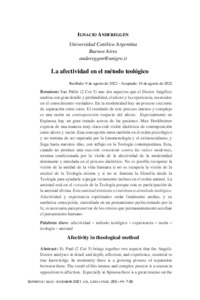Por favor, use este identificador para citar o enlazar este ítem:
https://repositorio.uca.edu.ar/handle/123456789/17493| Título: | La afectividad en el método teológico Afectivity in theological method |
Autor: | Andereggen, Ignacio Eugenio María | Palabras clave: | AFECTIVIDAD; FILOSOFIA CRISTIANA; EXPERIENCIA; RAZON; AMISTAD | Fecha de publicación: | 2021 | Editorial: | Pontificia Universidad Católica Argentina. Facultad de Filosofía y Letras | Cita: | Andereggen, I. E. M. La afectividad en el método teológico [en línea]. Sapientia. 2021, 77 (250). Disponible en: https://repositorio.uca.edu.ar/handle/123456789/17493 | Resumen: | Resumen: San Pablo (2 Cor 5) une dos aspectos que el Doctor Angélico
analiza con gran detalle y profundidad, el afecto y la experiencia, esenciales
en el conocimiento verdadero. En la modernidad hay un proceso creciente
de separación entre estos. El resultado de este proceso intenso y complejo
es una razón en contraposición respecto del afecto. Especialmente en
Espinosa hay un gran tratado acerca de las pasiones. Max Horkheimer
expresa de una manera muy clara está visión dialéctica de contraposición
entre afecto y razón. Esta concepción entra también en el orden psicológico
y no termina de ser superada por la fenomenología y el existencialismo, y
llega hasta nuestros días, con influjo en la Teología contemporánea. Esta,
cuando no produce una reacción consciente contra las raíces modernas,
termina condicionada por la visión de la afectividad de la modernidad
dominante y enredada en el proceso dialéctico. No es posible recuperar la
visión de la unidad de la vida humana si no se recupera la visión de la
unidad de la Teología misma y si no se ilumina la filosofía desde la
Teología para ayudarle a juzgar rectamente incluso en el orden natural. La
amistad está en el corazón de la Teología porque esta es participación de
la amistad divina. Esta amistad trinitaria es intrínseca al método teológico.
Afectividad y experiencia espirituales están finalmente unidas, y su
auténtica concepción, custodiada en un pensamiento perfeccionado por la
fe, es necesaria para preservar de los errores que permanentemente acechan
el pensamiento humano. Abstract: St. Paul (2 Cor 5) brings together two aspects that the Angelic Doctor analyses in detail and depth, affection, and experience, essential to true knowledge. In modernity there is a growing process of separation between these. The result of this intense and complex process is a reason in opposition to affection. Especially in Spinosa there is a great treatise on the passions. Max Horkheimer expresses in a very clear way this dialectical view of the contrast between affection and reason. This conception also enters the psychological order and is not finally overcome by phenomenology and existentialism, and it reaches the present day, with an influence on contemporary theology. The latter, when it does not produce a conscious reaction against the modern roots, ends up conditioned by the vision of affectivity of the dominant modernity and entangled in the dialectical process. It is not possible to recover the vision of the unity of human life if the vision of the unity of Theology itself is not recovered and if philosophy is not enlightened from Theology to help it to judge rightly even in the natural order. Friendship is at the heart of Theology because it is a participation in divine friendship. This Trinitarian friendship is intrinsic to the theological method. Spiritual affectivity and spiritual experience are ultimately united, and their authentic conception, guarded in a thought perfected by faith, is necessary to preserve from the errors which permanently beset human thought. |
URI: | https://repositorio.uca.edu.ar/handle/123456789/17493 | ISSN: | 0036-4703 | Disciplina: | TEOLOGIA | Derechos: | Acceso abierto | Fuente: | Sapientia. Vol.77, No.250, 2021 |
| Aparece en las colecciones: | SAP - 2021 Vol LXXVII nro. 250 |
Ficheros en este ítem:
| Fichero | Descripción | Tamaño | Formato | |
|---|---|---|---|---|
| afectividad-metodo-teologico.pdf | 308,6 kB | Adobe PDF |  Visualizar/Abrir |
Visualizaciones de página(s)
18
comprobado en 27-abr-2024
Descarga(s)
59
comprobado en 27-abr-2024
Google ScholarTM
Ver en Google Scholar
Este ítem está sujeto a una Licencia Creative Commons

